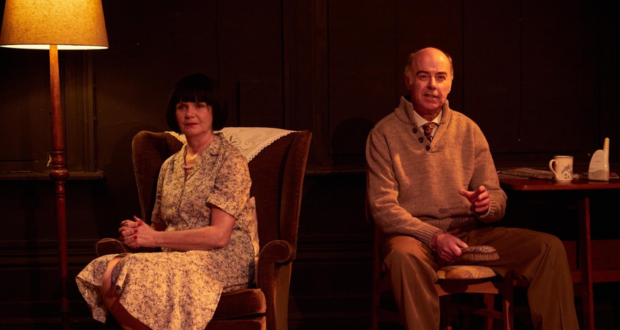Perceptive and thought-provoking portrait of a marriage. Summary
Rating
Good
Dennis and Gina have had their share of trials and upsets in a marriage of many decades. Now, in the roles of carer and cared-for, they tell the story of their courtship and family life through alternating monologues. It is, for the most part, a gentle narrative, with the sharp pain of past events blunted by acceptance, distance and helplessness.
This debut play from Dryad Theatre is a beautifully tender and perceptive portrait of a long marriage filled with compromises and accommodations, resentments and betrayals, care and affection. In this layered and nuanced story there are no heroes or villains, just ordinary flawed people whose marriage all those years ago was less a meeting of kindred spirits, more a collision of complementary needs. While Dennis is the more affable figure, it is hard not to sympathise with Gina who has, in a way, been killed with kindness.
Mark Steere and Susan Graham are perfectly cast and, under the direction of Finlay Glen, give conversational and engaging performances that draw us into their domestic world. Steere’s Dennis is lived-in and mild-mannered, but deceptively shrewd, while Graham’s Gina is poised and polished, jaded but with a likeable self-awareness and recognition of the irony of how life has turned out.
This is a very recognisable marriage with very recognisable dynamics. That said, the timeline of the relationship feels a bit hazy. Dennis and Gina’s courtship seems more like something from the sixties than the seventies, yet their children, who are slightly indistinct figures, don’t feel very firmly rooted in forty-somethingness. A small thing, but niggly.
While the small thrust staging area of the Hope Theatre serves very nicely as a living room / bedroom, with two poles created by Ceci Calf’s design, the scope for moving around the space is fairly limited. Despite this constraint Glen manages to create variety, while avoiding the impression of movement for movement’s sake. Though Gina and Dennis are in close proximity throughout, it does feel like they are in separate spaces.
There is a strikingly feminist aspect to Mark Bastin’s play, and Gina may well be right that her life would have been different had she been born a couple of decades later (or indeed into different wealth and class.) She is also absolutely right to point out the double standards in how men treat(ed) and label(led) women. However, the play is also sensitive to the expectations and stereotypes applied to men, with the implication that Dennis’ forbearance and nurturing nature are somehow not quite right, perhaps even deserving of scorn. Gina would certainly not consider To Have and To Hold to be suitable fare for a Valentine’s night out, whereas Dennis might do. I found it an entertaining and thoughtful evening, in the company of two very interesting characters.
Written by: Mark Bastin
Directed by: Finlay Glen
Produced by: Dryad Theatre
To Have and To Hold has completed its current run.
 Everything Theatre Reviews, interviews and news for theatre lovers, London and beyond
Everything Theatre Reviews, interviews and news for theatre lovers, London and beyond



